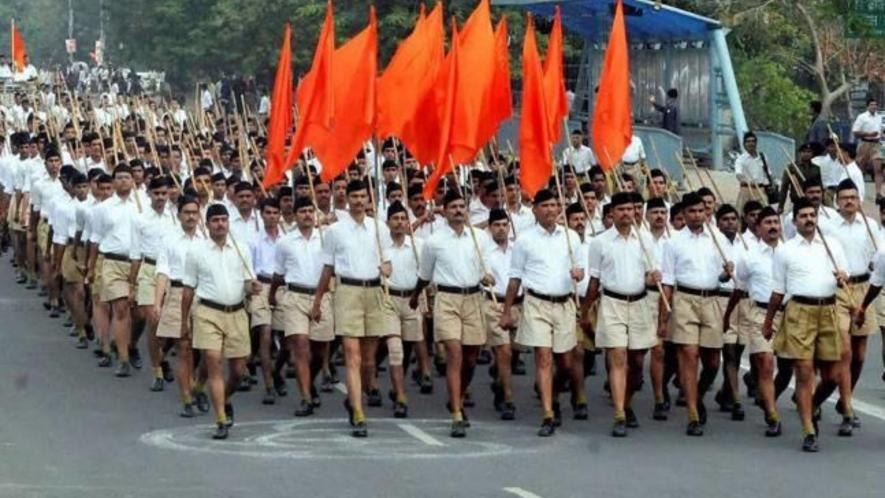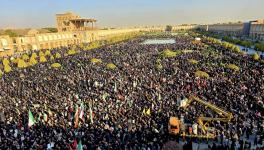RSS Calls for Status Quo in Guise of Emotional Unity

File Image
Mohan Bhagwat is the patriarch of the Rashtriya Swayamsevak Sangh, the force behind the political dispensation and many other organisations working for their dream of a Hindu nation across numerous educational, political, and social forums. On Dusshera, which the Sangh marks as Vijaya Dashami day, he provides his followers with its future focus or direction. His Dusshera speech reflects the ideology and political agenda of the Hindu-nationalist majoritarian politics that his outfit represents.
Accordingly, on 24 October, Bhagwat raised several points in his customary speech, clearly rephrasing the thoughts and formulations of the second Sangh sarsanghchalak or chief, MS Golwalkar. Golwalkar states in his book, ‘Bunch of Thoughts’, that “Muslims, Christians and communists” are the internal threats to the Hindu nation. Using seductive words, Bhagwat said in his speech that “cultural Marxism” is “selfish and deceitful” and seeks to divide the country by taking “control of the media and academia”.
He said such forces claim to work for “lofty goals”, but their fundamental objective is to disrupt all “orderliness and morality, beneficence, culture, dignity and restraint”. He said that these “destructive, all-devouring forces call themselves cultural Marxists or ‘woke’, or the awakened ones”. According to Bhagwat, their modus operandi is to take control over the media and academia and plunge education, culture, politics and the social environment into “confusion, chaos, and corruption”.
The term ‘woke’ has become a focus of many debates of late. It originated in the longings of African Americans to free themselves from the clutches of racism in the United States and the West and advance their quest for equality. The term has also come to symbolise those who wish to overcome the fetters of dictatorial or pre-democratic norms imposed by patriarchy and racial and class hierarchies.
But the terms ‘woke’ and ‘woke culture’ have gone global. Conservative politicians in Europe, Australia, and elsewhere have mocked demands for inclusivity as ‘woke’. They have deployed the term to oppose those who want their societies to strive for gender equality and environmental conservation.
RSS leader Ram Madhav wrote in The Indian Express on ‘India: The Modi Question’ (a BBC documentary on the Gujarat pogrom in 2002 when Narendra Modi was chief minister, viewing which was later prohibited in India) that the BBC fell into a “crisis of credibility” because of the rise of “woke culture” among British elites. But Madhav also thinks that the “BBC’s decline” is due to featuring a documentary like ‘The Modi Question’. He also supports the position of the Sarsanghchalak when he calls for a return to the roots—in short, to the values enshrined in the Manusmriti—and blames so-called “cultural Marxists” for having captured educational institutions and the media. According to him, cultural Marxists have developed a narrative which has projected Hinduism and caste as oppressive and exploitative by equating Hinduism with elite caste hegemony. It, therefore, follows that in Madhav’s worldview, the call for a caste census is divisive.
Those influenced by Marxism have indeed called for social change towards equality. This happened right through the struggle for India’s independence. It was Marxist Bhagat Singh and his comrades who brought to the fore the values of equality. When industrialisation and modern education slowly seeped into India, it expanded the progressive forces in the country, which stood for the overthrow of any ideological baggage that accompanied feudal society guided by traditional notions of class, caste and gender.
But it was not only the communists who stood for new nationwide movements towards equality-led social change. The social movements led by Jotirao Phule and BR Ambedkar were at the forefront of challenging all oppressive systems, including patriarchy, which had the elite castes dominate over the Dalits and women. Even the national freedom movement Mahatma Gandhi led constantly tried to widen the rebellion against oppressive social practices and made these battles integral to the struggles against the yoke of British colonialism.
Freedom of expression was also an integral part of the freedom movement and the hallmark of our glorious movement for independence. From Lokmanya Tilak to Gandhi and Jawaharlal Nehru, all stalwarts of the pre-Independence era adhered to and upheld it. Once the Constitution of India came into force, progressive people carried forward the same ideas of seeking an egalitarian society through their intellectual contributions, which included building the strong foundations of university education.
The freedoms exercised during the independence struggle solidified the democratic foundations of India’s emerging modern education system. New centres of excellence were developed, such as Jawaharlal Nehru University in Delhi, from which emerged a large number of writers, bureaucrats, police and other officials who continue to serve the country. Indeed, to see a systematic plan to ‘infiltrate’ centres of learning, as the two worthies claim while lamenting a deviation from unspecified “roots”, is ironical. After all, do they mean to imply that the entire process of the freedom struggle was not a part of our roots?
The Hindu-nationalist assertion that Marxists equated Hinduism with elite caste hegemony is totally false. Such a belief displays a superficial understanding of our heritage. They forget that Ambedkar, to whom they pay lip service for electoral reasons, had stated that Hinduism is dominated by Brahmanical values. Ambedkar, pained by the orthodox Hindu ethos, which refused to regard the Dalits as equal citizens and human beings, presided over a function in which the Manusmriti was set afire. He declared that he was born a Hindu—“that was not in my hands”—but I will not die a Hindu. Shortly before his death, he renounced Hinduism and accepted the vows of Buddhism. The conservative forces that refused to progress with the times led Ambedkar away from the “roots” that Bhagwat and Madhav uphold to this day.
The woke, the liberals who wish to break free from the chains of traditional hierarchies, are looked down upon by the stalwarts and followers of the Sangh alike. Liberals want to stick to the Indian Constitution and its dream of equal citizenship and status for all. They also believe in the inalienable rights of all human beings, as stated in the United Nations Charter on Human Rights.
Meanwhile, the RSS has systematically cultivated institutes like the Saraswati Shishu Mandir, whose teaching philosophy is in sync with caste and gender hierarchies that flow from pre-modern India. It has also floated outfits like the Shiksha Sanskriti Utthan Nyas, which came to the limelight for opposing rational, scholarly works such as by the Indophile and scholar on Hinduism, Wendy Doniger. Another RSS outfit forced the University of Delhi to delete a brilliant essay that sought to deepen our understanding of Indian tradition, AK Ramanujan’s ‘Three Hundred Ramayanas’. These are just a couple of examples.
It is not India’s liberalism which is creating divisiveness. Liberalism stands for freedom from patriarchy and caste oppression. The divisiveness in society is arising from the anti-minority propaganda being spread through innumerable RSS branches in which lakhs of Sangh volunteers and thousands of pracharaks or full-time propagandists participate.
As far as control over the media is concerned, the less said, the better. Ever since full-time RSS pracharak Lal Krishna Advani became the Information and Broadcasting minister in the Janata Dal ministry in 1977, large numbers of pro-RSS elements have found a place in the media. Today, the process of corporate houses taking over large sections of the press, which toe the RSS-BJP line, is nearly complete.
Last but not least, the ideologues of the Sangh paint the caste census as divisive, but it is simply another step towards social justice. Of course, the RSS opposes social justice tooth and nail.
The author is a human rights activist. The views are personal.
Get the latest reports & analysis with people's perspective on Protests, movements & deep analytical videos, discussions of the current affairs in your Telegram app. Subscribe to NewsClick's Telegram channel & get Real-Time updates on stories, as they get published on our website.
























